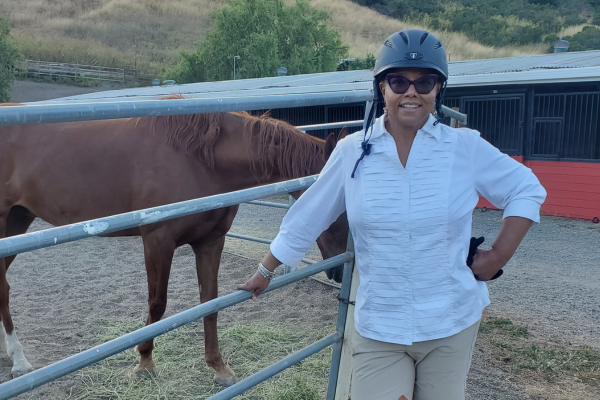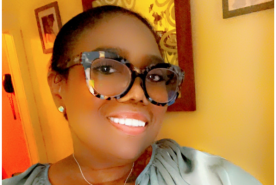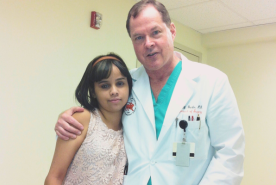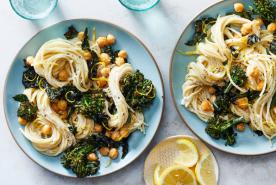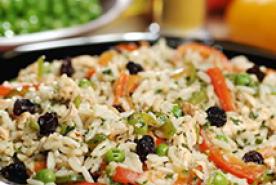June 29, 2023
The possibility of inheriting a genetic disease can cast a shadow on anyone's life, yet the Smith family never let the prospect get them down. Charlotte Smith takes after her family–always living life to the fullest despite her chances of inheriting an eventual diagnosis of polycystic kidney disease (PKD).
"I’m an adventurer at heart—I like to get in the car and drive in the direction the universe calls me. I'm active and love being with family, particularly my daughter," said Charlotte. "We canoe, hike all the nearby trails, and spend time riding my horse, Eclipse. I also have PKD."
This is her story.
It runs in the family
Charlotte inherited PKD from her father. He inherited it from his mother, who sadly passed away due to a lack of access to healthcare.
"My grandmother was very active in the community, volunteering at the Red Cross, the church, and PTA. She had a bunch of children and was very involved in their lives. In the early sixties, her kidneys failed and she became too ill to care for her family or community. She needed dialysis," Charlotte said. "Dialysis was available but not widely used and this was during Jim Crow so it definitely wasn't available to African-Americans. She died at the at 52 due to the lack of access."
Learn more about the social determinants of health.
While Charlotte never knew her grandmother, her legacy of love and hard work has lived on in her children and grandchildren.
"My dad was in the Navy for 22 years. He would always re-enlist but had to pass a physical each time," Charlotte said. "The last time he didn't pass because of his polycystic kidneys and liver. He received an honorable, medical discharge with 100% disability from the Veterans Administration. My mom is a nurse so she was the first to let me know that my father had the disease and it's genetic but I didn't fully understand at first."
Within a few years, Charlotte's father's kidneys failed, and he had to start in-center hemodialysis.
"The Navy nephrologist explained that it is a genetic disease that we, his children, have a 50/50 chance of inheriting. That's when I really understood what my mom was talking about. It sank in that the odds I'd inherit it were high," said Charlotte. "I went with him to his first dialysis appointment. I knew it was a blood-cleaning process but wasn't sure what to expect. He was anxious but powered through it. This experience helped when I had to start dialysis since I knew what to expect."
Charlotte's father survived 15 years on dialysis. During this time, Charlotte received her own PKD diagnosis.
"I was pregnant with my daughter in the late eighties, when there were no medications to slow or prevent PKD. Having pre-existing medical conditions created barriers for health insurance so I didn't seek a diagnosis. Up until the pregnancy I just focused on living a healthy lifestyle and keeping my blood pressure in check. When I was pregnant, I ended up with hyperemesis, where you throw up constantly, and was sent to the hospital," Charlotte said. "They did a scan of my abdomen and I could see both kidneys were full of cysts, confirming I inherited PKD."
Join an NKF Community to talk with others living with kidney disease.
Life on dialysis
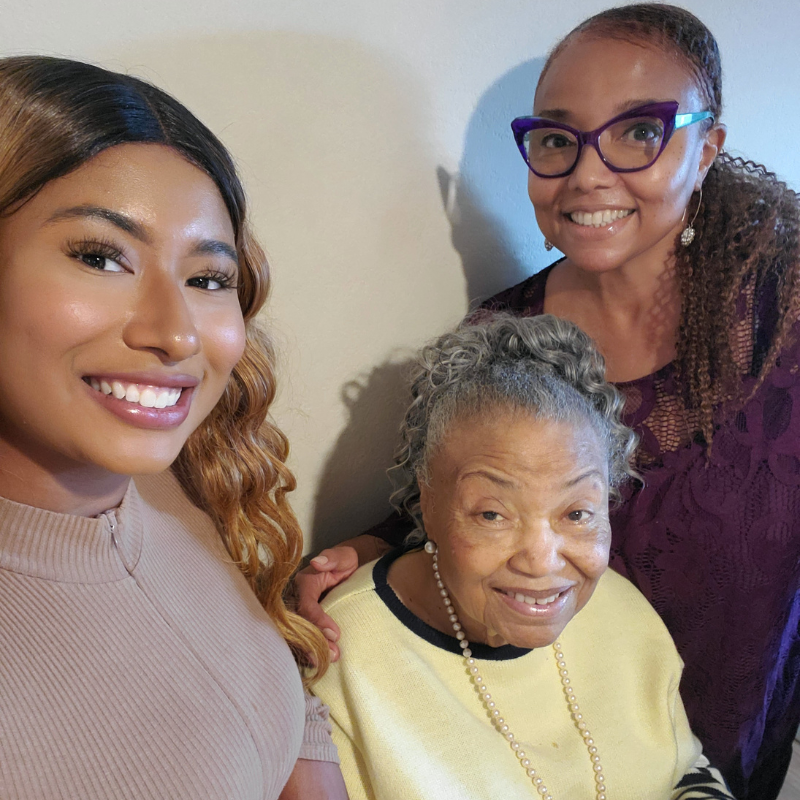
After twenty years of managing her PKD through healthy lifestyle choices, Charlotte had to confront the reality that her kidneys were failing.
"I needed shots for severe anemia. This was the first medical intervention I'd have prior to dialysis. I had to do something extra to compensate for my declining kidneys,” said Charlotte. “My creatinine continued to go up and my eGFR (then the African-American eGFR) was declining. My nephrologist said it was time to prepare for dialysis."
Charlotte asked if they could also discuss transplantation but was disappointed when the doctor said she’d have to wait to speak with the social worker at the dialysis center. She couldn’t accept this and changed physicians.
"I went to the new office, saw the surgeon, and had my fistula placed. However, a family member was interested in donating. I shared this information and the doctor said they'd prefer I go straight to transplant instead of dialysis," Charlotte said. "After a year of waiting to hear if they were a fit or not, the potential donor changed their mind."
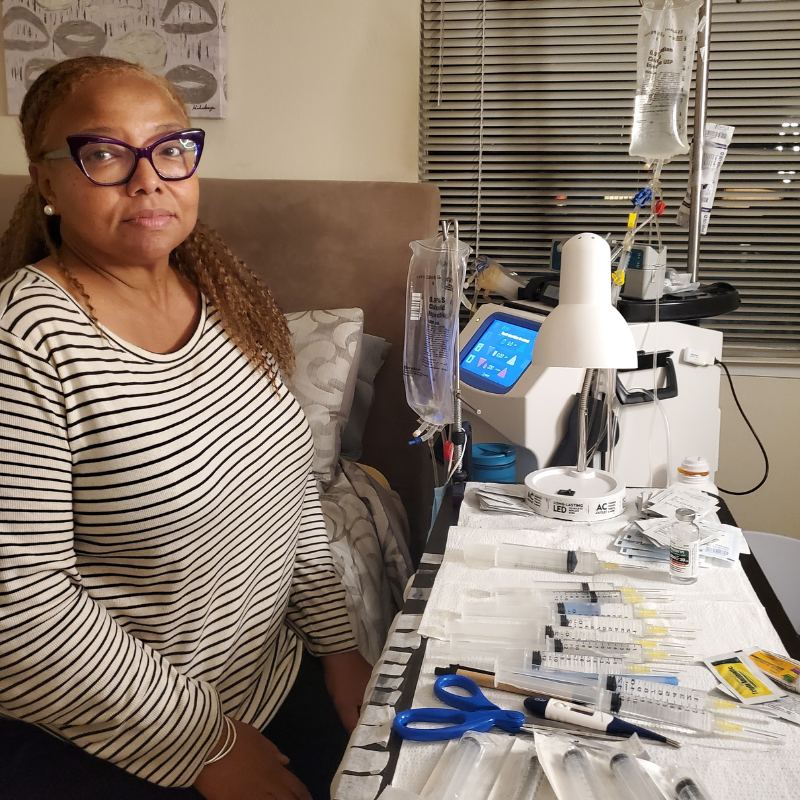
With that, Charlotte couldn't wait any longer and began home hemodialysis.
Send a message to your federal representative now and help more patients get access to home dialysis.
"My interest in science and medicine gave home hemodialysis a sort of novelty during the first year. After that, I began looking at my machine with a bit of resentment. Even when you're not on the machine, you're prepping for it," said Charlotte. "My sister who had been on dialysis was calling me every day but I needed additional professional support."
Charlotte sought a cognitive behavioral therapist and began getting respite care from the dialysis clinic every few months.
"Conversations with my therapist were incredibly helpful. Along the way, my therapist became educated about dialysis so they could understand the challenges I was going through," Charlotte said. "I also realized I had treatment fatigue. I started going in-center every six months for a month at a time. It was a nice break, and I recommend anybody deciding to do home hemodialysis build in some respite time."
You deserve support. Talk to someone who’s been there. Join NKF Peers, a peer mentoring program, where kidney patients are connected via phone with trained mentors who have been there themselves.
The path to transplant
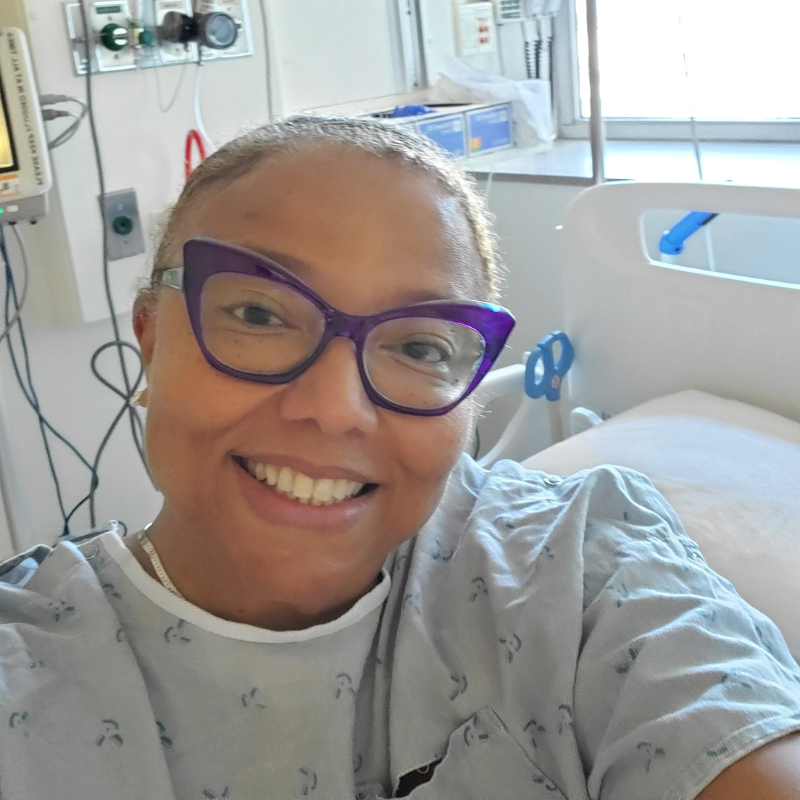
Charlotte worked hard to get on the transplant waitlist, losing ten pounds three months after starting dialysis.
"Kidneys from a living donor statistically do better long term than kidneys from deceased donors so I went to a workshop at the hospital to learn about finding one. The social worker explained they do about 375 transplants a year but the same number of patients get too ill and come off the list,” said Charlotte. “I was crushed but determined to do my best to stay healthy enough for a transplant."
It took five years, but finally, Charlotte received the letter she'd been waiting for.
"The letter said I was at the top of the list for a transplant but that my BMI was too high again. I channeled my inner G.I. Jane, set up boot camp stations in my apartment hallway, and enlisted the support of a dialysis nutritionist,” Charlotte said. “It took around eight months but I lost the weight and then began all the tests for transplantation."
Find a kidney dietitian near you.
Everything was going according to plan until an error caused her Medicare to get turned off.
"I rescheduled my tests a few times until I got Medicare back. Afterwards, I had the tests which all came back negative except for one. A CT scan found speckles on my lungs from catching COVID-19. I was in complete, utter distress not knowing if I'd be able to get a transplant at all. Thankfully, it didn't disqualify me," Charlotte said. "In August 2022, I got a call about a potential donor. A family was getting ready to turn off their loved one's life support."
Charlotte did her hemodialysis treatment before heading to the hospital. Five hours later, she learned that the person took more than an hour to pass away, disqualifying them from donating their kidney.
"After that, I decided to do a social media campaign for a kidney donor. I made a video showcasing my personality and had an ongoing log so people could see my story," Charlotte said. "There’s so much judgment around end-stage kidney disease, especially being African-American. If you aren't skinny, there is an assumption that you have kidney disease because you have no self-control, couldn't stop eating, or didn't take your diabetes medication. I hoped this video would show who I really was.”
Several friends stepped forward to donate but were disqualified due to health issues. Then, three months later, Charlotte got another call about a kidney. Yet again, it turned out not to be the right quality.
"Later that same afternoon, I received one last call from the living donor coordinator at the transplant unit. An altruistic donor had started the paired exchange process. All the kidneys were spoken for, except for one that matched me. I won the kidney lottery," Charlotte said. "My surgeon, Dr. Nancy Ascher, is also world-renowned for being the first woman to perform a liver transplant. She's featured in the Netflix documentary 'A Surgeon's Cut!'"
The surgery was a success, and despite a few hiccups during recovery, Charlotte is thriving.
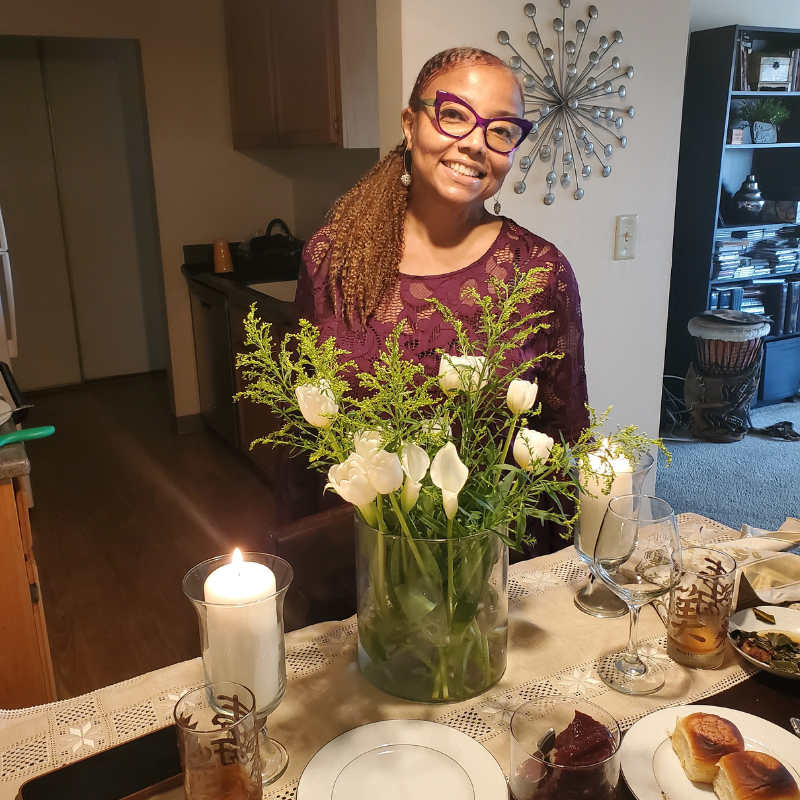
"I advise people with kidney disease to be an advocate for yourself and don't be afraid to ask for what you need," said Charlotte. "If your practitioner isn't open to that, consider finding a different one if you can. You are the owner of your body and know yourself best."
Not sure where to start? Call or email our Patient Information Help Line, NKF Cares. We are here to help
